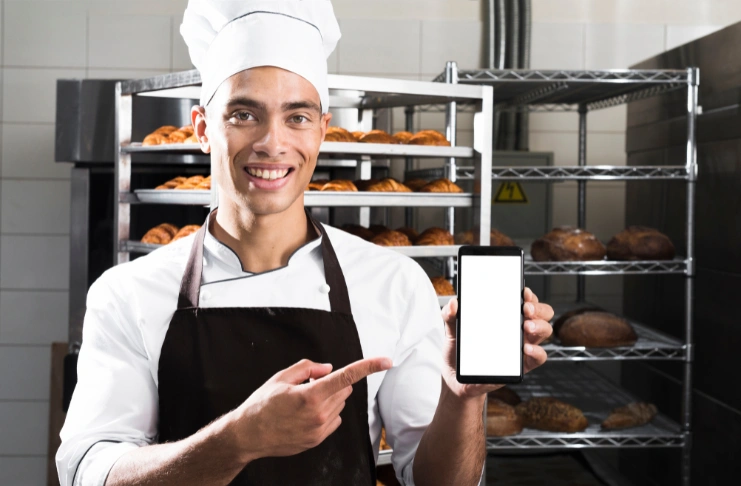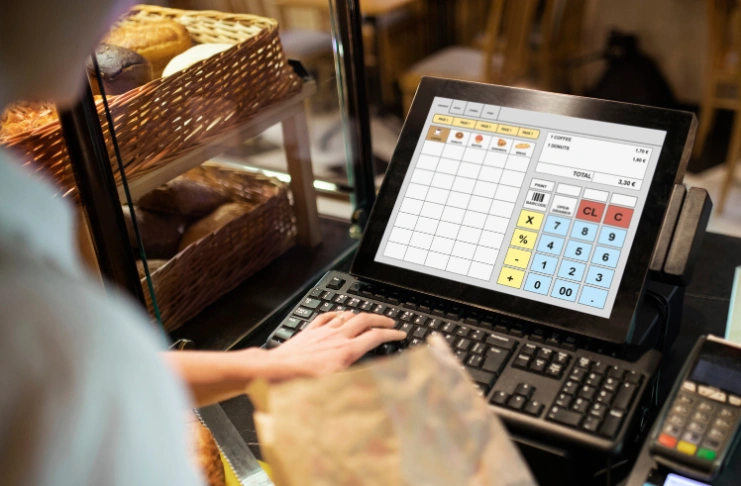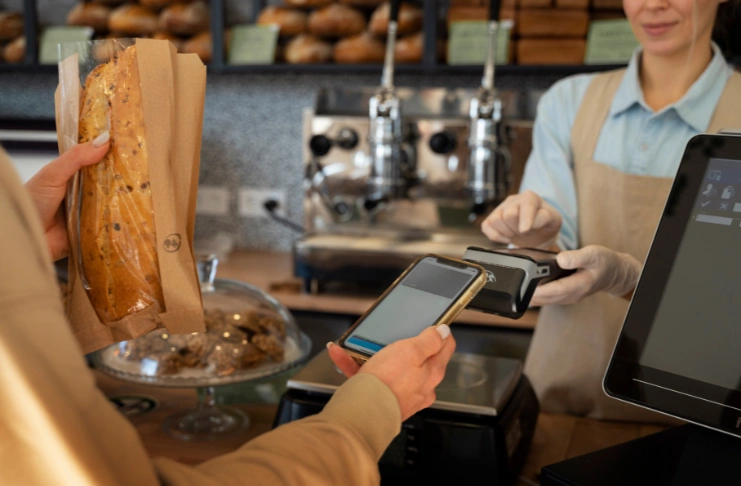The modern bakery industry is primarily defined by perishable inventory, narrow margins, and shifting customer expectations. In such conditions, operational clarity becomes absolutely non-negotiable. And that’s exactly where a bakery management system steps in.
Now, what is a BMS? What are the key Bakery Management System benefits and features? This guide covers it all.
What Is a Bakery Management System?

A bakery management system is a platform designed to oversee and optimize the operational, administrative, and customer-facing aspects of a bakery.
It centralizes everything from inventory tracking and employee scheduling to sales data and online order management in one place.
Unlike generic POS systems or basic accounting tools, a bakery-specific solution is purpose-built for the bakery industry. It understands the nuances of working with perishable items, managing shelf life, and ensuring regulatory compliance around food safety.
Whether you’re a single-location bakery or managing multiple outlets, a BMS gives you visibility into your entire business and helps you make faster, data-driven decisions while reducing manual work and minimizing errors that cut profit margins.
Key Features of Bakery Management Software

The right bakery software transforms how you manage your bakery’s core functions. Below are the key features of a Bakery Management System that support operational control, reduce overhead, and directly improve customer satisfaction.
1. Inventory Management
A good bakery software tracks raw materials, finished products, expiry dates, and stock levels in real time. It enables efficient inventory management by auto-updating counts as orders are placed and items sold, thereby reducing overstock, spoilage, and wastage.
2. Shelf Life Management
Shelf-life tracking ensures you serve only the freshest products while avoiding the financial hit of expired goods. Modern systems offer better shelf-life management tools to alert staff before perishable items reach their expiration date, helping bakeries maintain quality standards and comply with food safety regulations.
3. Order Management System

From online orders to in-store pickups, a unified order management module helps bakeries accept orders, schedule production, and assign tasks to staff. It also improves order processing speed and accuracy, which is essential during rush hours or promotional spikes.
4. POS Integration
The right bakery POS integration connects your point of sale to inventory, orders, and CRM. It not only accelerates transactions at the cash register but also enables better sales tracking, loyalty programs, and real-time customer data capture.
5. Employee Management
With a bakery management system, you can track employee hours, assign roles, and monitor employee performance from a single platform. This will help reduce payroll errors, human error, and accountability, especially during shift changes or staff shortages.
6. Advanced Booking Module
Are you struggling to handle bulk orders or catering gigs? An advanced booking module helps schedule and plan ahead, ensuring staff availability, raw ingredients, and production capacity are aligned. This minimizes last-minute chaos and enhances customer experience.
7. CRM and Loyalty Programs

A BMS allows you to build a loyal customer base with its built-in customer relationship management tools. These tools allow you to track preferences, manage loyalty programs, and offer personalized service based on order history and feedback, eventually leading to increased customer satisfaction and stronger retention.
8. Detailed Reporting and In-Depth Analysis
A professional-grade bakery system offers detailed reporting on everything from sales patterns to employee information and production planning. It helps you identify peak selling times, forecast demand, and perform an in-depth analysis of what’s driving revenue or dragging it down.
9. ERP Solutions for Scaling
Many systems now offer integration with full-scale ERP systems, connecting your bakery with broader supply chain, procurement, and accounting processes. These ERP solutions are critical for bakeries planning to expand or standardize operations across multiple locations.
Bakery Management System Benefits: How It Improves Operations?

The major selling point of bakery software is its ability to integrate and optimize every part of your daily workflow. From tracking raw materials to delivering the final baked goods, it enables smarter decisions, reduces inefficiencies, and enhances the overall customer experience.
Smarter Production Planning
Predictive production planning helps bakeries align demand with supply. You can use ERP systems and sales tracking to identify peak selling times, schedule prep accordingly, and reduce overproduction, resulting in minimal wastage and higher profit margins.
Improved Inventory Control
Manually managing inventory leads to spoilage, stockouts, or costly overstock. Bakery management systems automate stock level updates, track expiration dates, and alert managers when to reorder. The result? Efficient inventory management that supports both freshness and cost control.
Streamlined Order Fulfillment
Whether handling walk-ins, online orders, or corporate catering, bakery software simplifies the ordering process. It automates order queuing, tracks customizations, and manages lead times, ensuring consistency across all bakery operations.
Enhanced Employee Coordination

With built-in employee management features, assigning tasks, tracking employee hours, and monitoring shift changes becomes effortless. This boosts staff accountability and smooths high-pressure periods without operational hiccups.
Greater Customer Satisfaction
Speed, accuracy, and personalization are key drivers of customer satisfaction. With unified tools for loyalty programs, CRM, and order management, bakeries can serve faster, recommend smarter, and retain better, resulting in a consistently positive customer experience.
Reduced Waste and Better Shelf Life Management
Top bakery systems enable shelf life management by automatically rotating inventory based on expiry dates. This keeps perishable items moving, ensures product freshness, and cuts down on avoidable waste. Some tools even offer alerts for nearing expiration, further enhancing food safety.
Centralized Oversight for Multi-Location Operations

Scaling? With ERP-grade management systems, bakery chains can keep track of operations across outlets—from sales tracking to employee information to stock levels—in one dashboard. This unified view eliminates guesswork and supports top-down strategy execution.
Agile Response to Market Trends
Bakery management software provides real-time insights into customer demands and sales patterns. This enables quicker adaptation, whether that means updating menus, shifting promotions, or increasing output for trending items, keeping your bakery a step ahead.
INDUSTRY INSIGHT
| The global bakery processing equipment market is expected to hit $19.5 billion by 2030, fueled by rising demand for energy-efficient, cost-effective, and automated solutions. As labor and energy costs climb, bakeries are no longer asking if they should modernize but how soon. |
How Can You Integrate a Bakery Management System Into Your Workflow?

Implementing a bakery management system is not a plug-and-play decision. It requires a methodical rollout to ensure minimal disruption and maximum operational clarity. Here’s how to do it right:
Step 1: Audit Your Current Operations and Identify Gaps
Before choosing software, evaluate how your bakery business currently functions. Look at:
- How are you managing inventory
- What tools do you use for order management
- How do you track sales, employee hours, and raw materials
- Whether you have a POS system or rely on a traditional cash register
Pinpoint where inefficiencies exist. What would you like to improve in your operations? This clarity will help shape your system requirements.
Step 2: Choose the Right Software
Choose a bakery software solution tailored to your size and needs. Your system should include:
- Integrated bakery POS and sales tracking
- Robust inventory management features
- Alerts for expiry date and stock levels
- Built-in tools for loyalty programs and customer relationship management
- Modules for employee management and scheduling
- Support for online orders and multi-location control
If you’re scaling or running multiple outlets, consider full-fledged ERP systems with centralized dashboards and supply chain visibility.
Step 3: Migrate and Sync Data

Digitize your existing records: employee information, recipes, raw materials, vendor lists, and customer data. This will ensure that the management system operates clearly from day one.
Step 4: Train Your Team
Even the best software fails without staff buy-in. So,
- Train cashiers on the point-of-sale interface
- Show kitchen staff how to read auto-generated orders, reducing errors from handwritten orders.
- Educate managers on inventory control, employee performance tracking, and keeping track of low stock levels.
- Reinforce the “why”: Less chaos, better margins, more customer satisfaction.
Remember, hands-on sessions lead to faster adoption.
Step 5: Monitor, Optimize, and Scale
Once live, let the system work, and then refine it.
- Track metrics like waste levels, daily revenue, and employee performance
- Use in-depth analysis reports to identify peak selling times, adjust staffing, or even forecast raw ingredient needs
- Regularly review regulatory compliance settings to ensure safe practices
As the system proves ROI, you can add modules (like CRM or mobile dashboards), expand across locations, or upgrade to more advanced ERP solutions.
Conclusion
The bakeries that will thrive in 2025 and beyond are the ones that have full control over their operations. As consumer demands evolve and supply chains remain volatile, those leveraging bakery management systems and real-time data will simply outpace those that don’t.
Frequently Asked Questions
1. What are the advantages of a bakery management system?
A bakery management system helps automate daily tasks like inventory management, order processing, and sales tracking. It also helps bakeries cut waste, control costs, and streamline operations end-to-end.
2. What are the objectives of a bakery shop management system?
A bakery management system’s objectives are to centralize bakery operations, reduce manual workload, ensure regulatory compliance, and enable better decisions through real-time, detailed reporting and analytics.
3. What are the benefits of a bakery?
A bakery delivers fresh baked goods, supports local economies, and offers personalized customer experiences.
4. What role does management play in optimizing your bakery’s operations?
Bakery management coordinates inventory, staffing, scheduling, orders, and customer service. It keeps the entire business aligned, cost-efficient, and responsive to real-time customer demands.
5. What is the bakery management system?
A bakery management system is a digital solution that automates and integrates operations like inventory control, sales tracking, online orders, etc., helping bakery owners run streamlined, profitable shops.
6. What is the management of a bakery?
Bakery management involves planning, organizing, and controlling bakery processes to ensure smooth day-to-day operations.
7. What is the best bakery system?
The best bakery system is the one that fits your scale and goals. Look for a solution that offers POS software, ERP integration, advanced booking, and robust inventory management features.
8. What business structure is best for a bakery?
Most small to mid-sized bakeries benefit from an LLC for flexibility and liability protection. A corporation may be better suited for larger operations or franchises due to scalability and tax benefits.
9. What is the importance of using POS?
A POS system speeds up transactions, reduces errors, tracks sales patterns, manages inventory, and offers insights into customer behavior.
10. What software do bakeries use?
Bakeries use specialized bakery software with modules for order management, sales tracking, ERP systems, loyalty programs, and employee management. Popular tools include Restroworks, Square POS, CakeBoss, and Bakery ERP.
11. How can the production of a bakery be improved?
Bakery production can be improved through production planning, real-time stock monitoring, and using bakery management software that forecasts demand, tracks raw materials, and automates order processing.
12. What is the operational plan in a bakery business?
An operational plan in a bakery business outlines how the bakery will run and meet customer needs with minimal waste.





